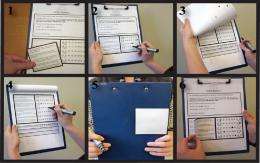People change moral position without even realizing it

Shortly after expressing a moral view about a difficult topic, people may easily endorse the opposite view and remain blind to the psychological mismatch, according to research published Sep. 19 in the open access journal PLOS ONE.
In the study, led by Lars Hall of Lund University, Sweden, participants were presented with a survey about moral issues, including foundational principles and current hot topics with moral implications. To complete the survey they had to flip over the first page of questions, which was displayed on a clipboard, and this is where the researchers implemented a design usually used in performance magic: the back of the clipboard had a patch of glue that caught the top layer of the questions, so when the page was flipped back over, an opposite version of the original questions was revealed but the answers remained unchanged. In other words, the participants' responses were opposite to their originally declared positions
The researchers then discussed the participants' answers with them, and found that many participants supported their reported answers, even though the responses were opposite to what the individual had originally intended to express. The authors write that "participants often constructed coherent and unequivocal arguments supporting the opposite of their original position," suggesting "a dramatic potential for flexibility in our moral attitudes."
Commenting on their results, Lars Hall says, "It could have significant impact on research that uses self-reported questionnaires. Either we would have to conclude that many participants hold no real attitudes about the topics we investigate, or that standard survey scales fail to capture the complexity of the attitudes people actually hold".
More information: Hall L, Johansson P, Strandberg T (2012) Lifting the Veil of Morality: Choice Blindness and Attitude Reversals on a Self-Transforming Survey. PLoS ONE 7(9): e45457. doi:10.1371/journal.pone.0045457














